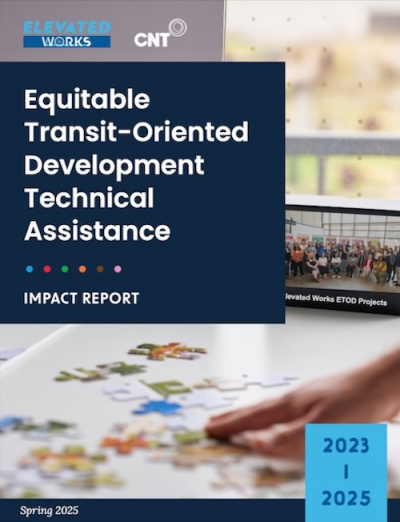
Smart Transit-Oriented Development is Starting to Catch on in Chicago
CNT commends Blair Kamin for his excellent article on transit-oriented development (TOD) in Sunday’s Chicago Tribune. He focuses on the new apartment building at 1611 W. Division, across from the Milwaukee/Division Blue Line station, that does not include a parking garage. Kamin’s article does an excellent job of highlighting an issue that the Center for Neighborhood Technology (CNT) has worked hard on advancing smart TOD. In 2013, CNT published a report on TOD in the... Continue reading »
CNT Ranks Regions for Transportation Affordability with Updated H+T Index
CHICAGO – Even though gas prices are down, costs for transportation are still high. How much we spend is based on where we live, according to data gathered by the Center for Neighborhood Technology (CNT) through the new version of its groundbreaking Housing and Transportation (H+T®) Affordability Index. The New York City region came in 1st, with the Chicago and Washington DC metro areas coming in at 2nd and 3rd respectively on the list for metropolitan areas of a million or... Continue reading »
CNT Research Leads to Flood Protection Fund Bill
Our recent report The Prevalence and Cost of Urban Flooding was a game changer in our efforts to keep homes and businesses dry and increase community resiliency in the face of increasingly severe rainstorms. We set out to pinpoint where exactly urban flooding was happening, and to our surprise we found that the majority of flood damage occurs outsideof designated floodplains. Because most flood relief programs focus on people who live within floodplains, we discovered... Continue reading »
Competition Combines Community and Technologists to Solve Real-World Issues
The Center for Neighborhood Technology today launched its 4th Annual Urban Sustainability Apps Competition with presenting sponsorMicrosoft. The CNT Apps Competition begins with a series of town hall meetings in several Chicago neighborhoods to reach non-developers and identify issues facing communities, and continues with technical training throughout the spring, provided by Microsoft. The competition culminates in a weekend event at Tech Nexus June 5-7, where teams create app... Continue reading »
Building a RainReady America
Across the country, millions of dollars are spent every year repairing the damage caused by urban flooding – and it’s likely to keep getting worse. Heavy rain events are increasing, absorbent surfaces are lost to concrete and asphalt, and resource-strapped cities have fewer and fewer funds available for large stormwater infrastructure projects. Our latest report, A RainReady Nation, offers a suite of cost-effective solutions to keep homes and businesses dry. The Center for Neighborhood... Continue reading »
Suburbs Can Advance Economic Development and Equality by Adding Housing Near Transit
Chicago’s northern suburbs are falling short in efforts to capitalize on the economic growth potential of building mixed-income TOD, according to our latest report. The report, Quality of Life, (e)Quality of Place, wasreleased today by CNT and the nonprofit Open Communities. CTA and Metra stops anchor most north suburban downtowns. Quality of Life, (e)Quality of Place found that mixed-income housing in those downtowns can boost neighborhood property values,... Continue reading »
What’s the Secret Behind America’s Most Innovative Cities?
A recent CNN Money series showcased the most innovative cities in America. Chicago came in at #4, in part because “…[Chicago’s] Center for Neighborhood Technology has contributed to innovations on the local level, like car-sharing and energy efficiency in homes.” Wow. We’re honored! But wait, there’s more: CNT also had a hand in projects inMinneapolis and Cleveland, two more cities on the most innovative list. We’re very proud to see our work recognized on the national stage.... Continue reading »
Helping America’s Utilities Start Fixing the Leaks
CNT’s November 2013 report, The Case for Fixing the Leaks, offered a look at the disconcerting state of America’s water infrastructure. The report found that America’s pipes leak a whopping 2.1 trillion gallons of treated water every year. In a time when parts of the country have been facing record-setting droughts, protecting our drinking water supply is more vital than ever. The Case for Fixing the Leaks was only the beginning. Since releasing the report, our water... Continue reading »
Illinois Gubernatorial Campaigns Neglect Public Transportation
The November 4 Illinois gubernatorial election is just around the corner. While there are many important topics being debated, we’re hearing next to nothing about funding for improved and expanded public transportation. For CNT, our Transit Future campaign, and the nearly half a million Cook County residents stranded in transit deserts, this is a critical issue. Our Transit Future partner organization, Active Transportation Alliance, even went as far as to offer ... Continue reading »
New HUD Guidebook Offers Transportation Strategies for Small and Mid-Sized Cities
For the average household, transportation is the second-highest expense after housing. In large, dense cities, public transit availability can dramatically decrease transportation costs. But what about smaller places – quiet suburbs, rural communities, regional centers – that don’t have the same level of public transit service? How can leaders in these communities find ways to reduce transportation costs to help low- and middle-income residents get ahead? A recent HUD publication ... Continue reading »





 Strengthening Transit Through Community Partnerships
Strengthening Transit Through Community Partnerships








